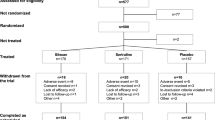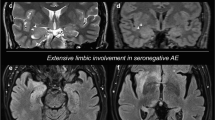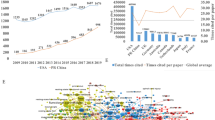Abstract
The risk of depression is increased in chronic neurologic illness and can adversely affect the course of disease. Recent literature is reviewed for depression in stroke, epilepsy, and multiple sclerosis. Depression can share pathophysiologic aspects of the comorbid illness, such as neurotransmitter pathway disturbances, hypothalamuspituitary-adrenal pathway disturbances, and changes in immunologic function. Depression also can be a psychologic reaction to the burden of the neurologic condition. Risk factors for development of depression are reviewed. Depression and other medical conditions can have shared symptoms (eg, fatigue, psychomotor retardation) that can complicate the diagnosis of depression in neurologic illness. Proper selection of antidepressant treatment is necessary to avoid worsening the neurologic disorder.
Similar content being viewed by others
References and Recommended Reading
Rickards H: Depression in neurological disorders: Parkinson’s disease, multiple sclerosis, and stroke. J Neurol Neurosurg Psychiatry 2005, 76(Suppl 1):i48–52.
Robinson RG: Poststroke depression: prevalence, diagnosis, treatment, and disease progression. Biol Psychiatry 2003, 54:326–387.
Williams LS, Ghose SS, Swindle RW: Depression and other mental health diagnoses increase mortality risk after ischemic stroke. Am J Psychiatry 2004, 161:1090–1095.
Tank WK, Chan SS, Chiu HF, et al.: Poststroke depression in Chinese patients: frequency, psychosocial, clinical, and radiological determinants. J Geriatr Psychiatry Neurol 2005, 18:45–51.
Vataja R, Leppavuori A, Pohjasvaara T, et al.: Poststroke depression and lesion location revisited. J Neuropsychiatr Clin Neursci 2004, 16:156–162.
Robinson RG: Post-stroke mood disorder. Hosp Pract 1986, 83–89.
Cassidy E, O’Connor R, O’Keane V: Prevalence of post-stroke depression in an Irish sample and its relationship with disability and outcome following inpatient rehabilitation. Disabil Rehab 2004, 26:71–77.
Carson AJ, McHale S, Allen K, et al.: Depression after a stroke and lesion locator synthesis: a systematic review. Lancet 2000, 356:122–126.
Narushima K, Kosier JT, Robinson RG: A reappraisal of poststroke depression, intra- and inter hemispheric lesion location using meta-analysis. J Neuropsychiatry Clin Neurosci 2003, 5:423–430.
Desmond DW, Remien RH, Moroney JT, et al.: Ischemic stroke and depression. J Internat Meurophysiol Soc 2003, 9:429–439.
Rapoport MJ, McCullagh S, Shammi P, et al.: Cognitive impairment associated with major depression following mild and moderate traumatic brain injury. J Neuropsychiatry Clin Neurosci 2005, 17:61–65.
Tang WK, Ungvari GS, Chiu HF, et al.: Detecting depression in Chinese stroke patients: a pilot study comparing four screening instruments. Int J Psychiatry Med 2004, 34:155–163.
Tang WK, Ungvari GS, Chiu HF, et al.: Screening post-stroke depression in Chinese older adults using the hospital anxiety and depression scale. Aging Mental Health 2004, 8:397–399.
Dieguez S, Staub F, Bruggimann L, et al.: Is poststroke depression a vascular depression? (Review). J Neurol Sci 2004, 226:53–58. This article examines how stroke and depression can each predispose patients to the other condition. It is an excellent review of the concept of poststroke depression as being vascular in origin.
Kim JM, Stewart R, Shin IS, et al.: Vascular disease/risk and late-life depression in a Korean community population. Br J Psychiatry 2004, 185:102–107.
Neu P, Schlattmann P, Schilling A, et al.: Cerebrovascular reactivity in major depression: a pilot study. Psychosom Med 2004, 66:6–8.
Mast BT, MacNeill SE, Lichtenberg PA: Post-stroke and clinically-defined vascular depression in geriatric rehabilitation patients. Am J Geriatr Psychiatry 2004, 12:84–92.
Lipsey JY, Robinson RG, Pearlson GD, et al.: Nortriptyline treatment of post stroke depression: a double-blind study. Lancet 1984, 1:297–300.
Hackett ML, Anderson CS, House AO: Interventions for treating depression after stroke. [Review]. Cochrane Database Syst Rev 2004, 3:CD003437.
Rampello L, Chiechio S, Nicoletti G, et al.: Prediction of the response to citalopram and reboxetine in post-stroke depressed patients. Psychopharmacology 2004, 173:73–78.
Andersen G, Vestergaard K, Lauritzen L: Effective treatment of post stroke depression with the selective serotonin reuptake inhibitor citalopram. Stroke 1994, 25:1099–1104.
Niedermaier N, Bohrer E, Schulte K, et al.: Prevention and treatment of poststroke depression with mirtazapine in patients with acute stroke. J Clin Psychiatry 2004, 65:1619–1623.
Fruehald S, Gatterbauer E, Rehak P, et al.: Early fluoxetine treatment of post-stroke depression- a three-month doubleblind placebo-controlled study with an open-abel long-term follow-up. J Neurol 2003, 250:347–351.
Jorge RE, Robinson RG, Arndt S, et al.: Mortality and poststroke depression, a placebo-controlled trial of antidepressants. Am J Psychiatry 2003, 160:1823–1829.
Erikkson M, Asplund K, Glader EL, et al.: Self-reported depression and use of antidepressants after stroke: a national survey. Stroke 2004, 35:936–941.
Wiart L, Petit H, Joseph PA, et al.: Fluoxetine in early poststroke depression: the double-blind placebo-controlled study. Stroke 2000, 31:1829–1832.
Paolucci S, Antonucci G, Grasso MG, et al.: Poststroke oppression, antidepressant treatment and rehabilitation results. A case-controlled study. Cerebrovasc Dis 2001, 12:264–271.
Kimura M, Robinson RG, Kosier JT: Treatment of cognitive impairment after post of depression: a double-blind treatment trial. Stroke 2001, 32:1048–1049.
Cole MG, Elie LM, McCusker J: Feasibility and effectiveness of treatments for post-stroke depression and elderly inpatients: systematic review. J Geriatr Psychiatry Neurol 2001, 14:37–41.
Jorge RE, Robinson RG, Tateno A, et al.: Repetitive transcranial magnetic stimulation is treatment of poststroke depression: a preliminary study. Biol Psychiatry 2004, 55:398–405.
Lincoln NB, Flannaghan T: Cognitive behavioral psychotherapy for depression following strokes: a randomized controlled trial. Stroke 2003, 34:111–115.
Shoemaker N: Depression and stroke. Improving patient outcomes with a team approach. Caring 2001, 20:6–8.
Davis MC: Life review therapy as an intervention to manage depression and enhance life satisfaction in individuals with right hemisphere cerebral vascular accidents. Issues Mental Health Nurs 2004, 5:503–515.
Jones JE, Hermann BP, Barry H, et al.: Clinical assessment of Axis I psychiatric morbidity in chronic epilepsy: a multicenter investigation. J Neuropsychiatry Clin Neurosci 2005, 17:172–179.
Ettinger A, Reed M, Cramer J: Epilepsy Impact Project Group. Depression and comorbidity in community based patients with epilepsy or asthma Neurology 2004, 636:1008–1014.
Beghi E, Spagnoli P, Airoldi L, et al.: Emotional and affective disturbances in patients with epilepsy. Epilepsy Behav 2002, 3:225–261.
Schmitz B: Depression and mania in patients with epilepsy. Epilepsia 2005, 46(Suppl 4):45–49.
Piazzini A, Canevini MP, Maggiori G, Canger R: Depression and anxiety in patients with epilepsy. Epilepsy Behav 2001, 2:481–489.
Victoroff JI, Benson F, Grafton ST, et al.: Depression in complex partial seizures. Electroencephalograhy and cerebral metabolic correlates. Arch Neurol 1994, 51:155–163.
Quiske A, Helmstaedter C, Lux S, Elger CE: Depression in patients with temporal lobe epilepsy is related to mesial temporal sclerosis. Epilepsy Res 2000, 39:121–125. Beck Depression Inventory was administered to 60 patients. Multivariate analysis indicated significantly higher score in mesial temporal sclerosis regardless of lesion lateralization.
Helmstaedter C, Sonntag-Dillender M, Hoppe C, Elger CE: Depressed mood and memory impairment in temporal lobe epilepsy as a function of focus of lateralization and localization. Epilepsy Behav 2004, 5:696–701.
Mazza M, Orsucci F, De Riso S, et al.: Epilepsy and depression: risk factor for suicide? Clin Ter 2004, 155:425–427.
Caplan R, Siddarth P, Gurbani S, et al.: Depression and anxiety in pediatric epilepsy. Epilepsia 2005, 46:720–730.
Forsgren L, Nystrom L: An incident case referent study of epileptic seizures in adults. Epilepsy Res 1990, 6:66–81.
Herdorffer DC, Hauser WA, Annegers JF, Cascino G: Major depression is a risk factor for seizures in older adults. Ann Neurol 2000, 47:246–249.
Kanner AM, Balabanov A: Depression and epilepsy: how closely related are they? Neurology 2002, 58(8 Supp 5):27–39.
Jobe P: Common pathogenic mechanisms between depression and epilepsy: an experimental perspective. Epilepsy Behav 2003, 4(Supp 3):14–24.
Kanner AM: Depression in epilepsy: a frequently neglected multifaceted disorder. Epilepsy Behav 2003, 4(Suppl_4):11–19.
Paradiso S, Hermann BP, Blumer D, et al.: Impact of depressed mood on neuropsychological status in temporal lobe epilepsy. J Neurol Neurosurg Psychiatry 2001, 70:180–185.
Altshuler L, Rausch R, Delrahim S, et al.: Temporal lobe epilepsy, temporal lobectomy and major depression. J Neuropsychiatry Clin Neurosci 1999, 11:436–443.
Reuber M, Andersen B, Elger CE, Helmstaedter C: Depression and Anxiety before and after temporal lobe epilepsy. Seizure 2004, 13:129–135.
Cankurtaran ES, Ulug B, Saygi S, et al.: Psychiatric morbidity, quality of life and disability in mesial temporal lobe epilepsy patients before and after surgery. Epilepsy Behav 2005, 7:116–122. Abstract.
Wrench J, Wilson SJ, Bladin PF: Mood disturbance before and after seizure surgery: a comparison of temporal and extra temporal lobe resection. Epilepsia 2004, 45:534–543.
Quigg M, Broshek DK, Heidel-Schiltz S, et al.: Depression in intractable partial epilepsy varies by laterality of focus and surgery. Epilepsia 2003, 44:419–424.
Glosser G, Zwil AS, Glosser DS, et al.: Psychiatric aspects of TLE before and after anterior temporal lobectomy. Neurol Neurosurg Psychiatry 2000, 68:53–55.
Derry PA, Rose KJ, McLaclan RS: Moderators of the effect of preoperative emotional adjustment on post operative depression after surgery for temporal lobe epilepsy. Epilepsia 2000, 41:177–188.
Selai C, Bannister D, Trimble M: Antiepileptic drugs and the regulation of mood and quality of life (QOL): The evidence from epilepsy. Epilepsia 2005, 46(Supp 4):50.
Kalinin VV, Polyanskiy DA: Gender differences in risk factor of suicidal behavior in epilepsy. Epilepsy Behav 2005, 6:424–429.
Aldenkamp A-P, Arends J, Bootsma H-P, et al.: Randomized double blind parallel group study comparing cognitive effects of a low dose lamotrigine with valproate and placebo in healthy volunteers. Epilepsia 2002, 43:19–26.
Lopez-Gomez M, Ramirez-Bermudez J, Campillo C, et al.: Primidone is associated with interictal depression in patients with epilepsy. Epilepsy Behav 2005, 6:413–416.
Savic I, Lindstrom P, Gulyas B, et al.: Limbic reduction of 5HT1A receptor binding in human temporal lobe epilepsy. Neurology 2004, 52:1343–1351.
Theodore WH: Does serotonin play a role in epilepsy? Epilepsy Curr 2003, 3:173–177. This review discusses experimental research preformed on 5HT receptors. The article explores the role of 5HT in the shared pathogenesis of depression and epilepsy.
Pericic D, Lazic J, Svob Strac D: Anticonvulsant effects of acute and repeated fluoxetine treatment in unstressed and stressed mice. Brain Res 2005, 1033:90–95.
Clinkers R, Smolders I, Meurs A, et al.: Anticonvulsant action of hippocampal dopamine and serotonin is independently mediated by D and 5-HT receptors. J Neurochem 2004, 89:834–843.
Hernandez EJ, Williams PA, Dudek FE: Effects of fluoxetine and TFMPP on spontenous seizures in Rats with pilocarpine induced epilepsy. Epilepsia 2002, 43:1337–1345.
Specchio LM, Iudice A, Specchio N, et al.: Citalopram as treatment of depression in patients with epilepsy. Clin Neuropharmacol 2004, 27:133–136.
Preuter C, Norra C: Mood disorders and their treatment in patients with epilepsy. J Neuropsychiatry Clin Neurosci 2005, 17:20–28.
Willer CJ, Ebers GC: Susceptibility to multiple sclerosis: interplay between genes and environment. Curr Opin Neurol 2000, 13:241–247.
Sotgiu S, Pugliatti M, Fois ML, et al.: Genes, environment, and susceptibility to multiple sclerosis. Neurobiol Dis 2004, 17:131–143.
Minden SL, Orav J, Reich P: Depression in multiple sclerosis. Gen Hosp Psychiatry 1987, 9:426–434.
Sandovnick AD, Remick RA, Allen J, et al.: Depression and multiple sclerosis. Neurology 1996, 46:629–632.
Joffe RT, Lippert GP, Gray TA, et al.: Mood disorder and multiple sclerosis. Arch Neurol 1987, 44:376–378.
Schiffer RB, Caine ED, Bamford KA, Levy S: Depressive episodes in patients with multiple sclerosis. AM J Psychiatry 1983, 140:1498–1500.
Paten SB, Beck CA, Williams JV, et al.: Depression in multiple sclerosis: a population based perspective. Neurology 2003, 61:1524–1527.
Sadovnik AD, Eisen RN, Ebers GC, Paty DW: Cause of death in patients attending multiple sclerosis clinics. Neurology 1991, 41:1193–1196.
Feinstein A, Roy P, Lobaugh N, Feinstein K, et al.: Structural brain abnormalities in multiple sclerosis patients with major depression. Neurology 2004, 62:586–590.
Pujol J, Bello J, Deus J, Cardoner N, et al.: A. Beck Depression Inventory factors related to demyelinating lesions of the left arcuate fasciculus region. Psychiatry Res 2000, 99:151–159.
Berg D, Supprian T, Thomaae J, et al.: Lesion Pattern in patients with multiple sclerosis and dperssion. Mult Scler 2000, 6:156–162.
Benesova Y, Neidermayerova I, Mechl M, Havlikova P: The relation between brain MRI lesions and depressive symptoms in multiple sclerosis. Bratisl Lek Listy 2003, 104:174–176.
Zorzon M, De Masi R, Nasuelli D, et al.: Depression and anxiety in multiple sclerosis. A clinical and MRI study in 95 subjects. J Neurol 2001, 248:416–421.
Zorzon M, Zivadinoov R, Nasuelli D, et al.: Depressive symptoms and MRI changes in multiple sclerosis. Eur J Neurol 2002, 9:491–496.
Baskshi R, Zxzrnecki D, Shaikh ZA, Priore RL, et al.: Brain MRI lesions and atrophy are related to depression in multiple sclerosis 2003, 9:284–288.
Zhbad RK, Patten SB, Metz L: The association of depression with disease course in multiple sclerosis. Neurology 2005, 64:359–360.
Mikova O, Yakimova R, Bosmans E, et al.: Increased serum tumor necrosis factor alpha concentrations in major depression and multiple sclerosis. Eur Neuropsychopharmacol 2001, 11:203–208.
Kahl KG, Kruse N, Faller H, et al.: Expression of tumor necrosis factor alpha and interferon gamma mRNA in blood cell correlates with depression cores during an acute attack in patients with multiple sclerosis. Psychoneuroendocrinology 2002, 27:671–681.
Mohr DC, Gookin DE, Idlar J, et al.: Treatment of depression is associated with nonspecific and antigen specific T(H)1 responses in multiple sclerosis. Arch Neurol 2001, 58:1081–1086.
Randolph JJ, Arnet PA: Depression and fatigue in relapsingremitting MS: the role of symptomatic variability. Mult Scler 2005, 11:186–190.
Jannsens AC, van Doorn PA, de Boer JB, et al.: Perception of prognostic risk in patients with multiple sclerosis: the relationship with anxiety, depression and disease related distress. J Clin Epidemiol 2004, 57:180–186.
Jopson NM, Moss-Morris R: The role of illness severity and illness representations in adjusting to multiple sclerosis. J Psychosom Res 2003, 54:503–311.
Kneebone II, Dunmore EC, Evans E: Symptoms of depression in older adults with multiple sclerosis (MS): comparison with a matched sample of younger adults. Aging Ment Health 2003, 7:182–185.
Feinstein A: Multiple sclerosis, disease modifying treatments and depression: a critical methodological review. Mult Scler 2000, 6:343–348.
Klapper MD: Letter to the editor [letter]. Neurology 1994, 44:188.
Jacobs LD, Beck RW, Simon JH, et al.: Intramuscular interferon Beta-1a therapy initiated during a first demyelinating event in multiple sclerosis. New Engl J Med 2000, 343:898–904.
Patten SB, Metz LM: Interferon B1a and depression in secondary progressive MS: Data from the SPECTRIMS trial. Neurology 2002, 59:744–746.
Patten SB, Metz LM: Interferon beta-1a and depression in relapsing-remitting multiple sclerosis: an analysis of depression data from the PRISMS clinical trial. Multiple Scler 2001, 7:243–248.
Feinstein A, O’Connor P, Feinstein K: Multiple sclerosis, interferon beta 1-b and depression: A prospective investigation. J Neurol 2002, 249:815–820.
Mohr DC, Likosky W, Dwyer P, et al.: Course of depression during the initiation of interferon beta-1a treatment for multiple sclerosis. Arch Neurol 1999, 56:1263–1265.
Patten SB, Fridhandler S, Beck CA, Metz LM: Epressive symptoms in a treated multiple sclerosis cohort. Mult Scler 2003, 9:616–619.
Patten SB, Francis G, Metz LM, Lopez-Bresnahan M, Chang P, Curtin F, et al.: The relationship between depression and interferon beta therapy in patients with multiple sclerosis. Mult Scler 2005, 11:175–181.
Benedetti F, Campori E, Colombo C, Smeraldi E: Fluvoxamine treatment of major depression associated with multiple sclerosis. J Neuropsychiatry Clin Neurosci 2004, 16:364–366.
Schiffer RB, Wineman NM: Antidpressant pharmacotherapy of depression associated with multiple sclerosis. Am J Psychiatry 1990, 147:1493–1497.
Brank Y, Ur E, Achiron A: Mclobemide treatment in multiple sclerosis patients with comorbid depression: an open label safety trial. J Neuropsychiatry Clin Neurosci 1999, 11:271–273.
Scott TF, Nussbaum P, McConnell H, Brill P: Measurement of treatment response to sertraline in multiple sclerosis patients using the Carroll Scale. Neurol Res 1995, 7:421–422.
Feinstein A: The neuropsychiatry of multiple sclerosis. Can J Psychiatry 2004, 49:157–163.
Mohr DC, Boudewy AC, Goodkin DE, et al.: Comparative outcomes for individual cognitive behavior therapy, supportive-expressive group psychotherapy, and sertraline for the treatment of deprssion in multiple sclerosis. J Consulting Clin Psychol 2001, 69:942–949.
Mohr DC, Gookin DE: Treatment of Depression in multiple sclerosis. Clin Psychol Sci Pract 1999, 6:1–9.
Tesar N, Baumhackl U, Kopp M, Gunther V: Effects of psychological group therapy in patients with multiple sclerosis. Acta Neurologica Scandinavica 2003, 107:394–399.
Mohr DC, Likosky W, Bertagnolli A, et al.: Telephone administered cognitive behavioral therapy for treatment of depressive symptoms in multiple sclerosis. J Consult Clin Psychol 2000, 68:356–361.
Rodgers D, Khoo K, MacEachen M, et al.: Cognitive therapy for multiple sclerosis: a preliminary study. Altern Ther Health Med 1996, 2:70–74.
Mohr DC, Hart SL, Goldberg A: Effects of treatment for depression on fatigue in multiple sclerosis. Pscyhosom Med 2003, 65:542–547.
Messmer UM, Mancuso ML, Battaglia MA, et al.: Peer support groups in multiple sclerosis: curret effectiveness and future directions. Mult Scler 2004, 10:80–84.
Mohr DC, Burke H, Beckner V, Merluzzi N: A preliminary report on a skills-based telephone-administered peer support program for patients with multiple sclerosis. Mult Scler 2005, 11:222–226.
Author information
Authors and Affiliations
Rights and permissions
About this article
Cite this article
Sobel, R.M., Lotkowski, S. & Mandel, S. Update on depression in neurologic illness: Stroke, epilepsy, and multiple sclerosis. Curr Psychiatry Rep 7, 396–403 (2005). https://doi.org/10.1007/s11920-005-0043-2
Issue Date:
DOI: https://doi.org/10.1007/s11920-005-0043-2




